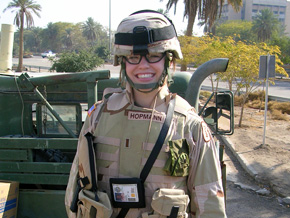Healing in a War Zone

PAGE 2
In October 2006, a ticket home to safety and family awaited Capt. Christensen—and she was terrified. "On the plane back, my friend pretty much had to knock me out," she says. "I had really bad feelings that I had changed a lot and my family would look at me different. I was nervous that my fiancé would say, 'I don't want to be with you anymore.'"
While much of Veronica's fictional story has yet to be written, Capt. Christensen is living her happy ending. Married in August 2008, the 28-year-old is now a reservist working in intensive care at a civilian hospital. "My thoughts about my life and the world have changed, but I myself have not," she says. "I do have friends and colleagues that have changed for the worse. They showed signs of PTSD (post-traumatic stress disorder), so some of them are seeking treatment for that. Some of them got on drugs to cope, so it's been sad to hear that."
Schilling has delved into countless books and documentaries to prepare for the role, but her correspondence with a combat nurse has been her biggest inspiration. "She said, in practice, she wouldn't fire her gun because neither she nor her patient were in direct danger. That sort of sums up to me in an interesting way that you go there to do your job, but you don't want to add to the violence," she says. "I think being a healer in a war zone is a really interesting dichotomy and the people that do it are remarkable."
What many back home don't realize is that being a healer in a war zone means caring for everyone. Capt. Christensen says that includes insurgents. "In the hospital, we had a false sense of security because sometimes we thought that maybe they wouldn't try to bomb their own people. That didn't work; they still tried," she says. "It does get challenging. The first patient you take care of that is not a good guy? You kind of have that in the back of your head. After you take care of so many, you kind of forget and do what you have to do."
While much of Veronica's fictional story has yet to be written, Capt. Christensen is living her happy ending. Married in August 2008, the 28-year-old is now a reservist working in intensive care at a civilian hospital. "My thoughts about my life and the world have changed, but I myself have not," she says. "I do have friends and colleagues that have changed for the worse. They showed signs of PTSD (post-traumatic stress disorder), so some of them are seeking treatment for that. Some of them got on drugs to cope, so it's been sad to hear that."
Schilling has delved into countless books and documentaries to prepare for the role, but her correspondence with a combat nurse has been her biggest inspiration. "She said, in practice, she wouldn't fire her gun because neither she nor her patient were in direct danger. That sort of sums up to me in an interesting way that you go there to do your job, but you don't want to add to the violence," she says. "I think being a healer in a war zone is a really interesting dichotomy and the people that do it are remarkable."
What many back home don't realize is that being a healer in a war zone means caring for everyone. Capt. Christensen says that includes insurgents. "In the hospital, we had a false sense of security because sometimes we thought that maybe they wouldn't try to bomb their own people. That didn't work; they still tried," she says. "It does get challenging. The first patient you take care of that is not a good guy? You kind of have that in the back of your head. After you take care of so many, you kind of forget and do what you have to do."



